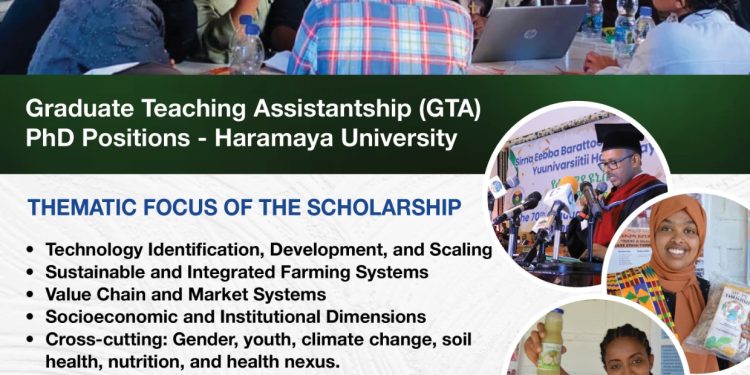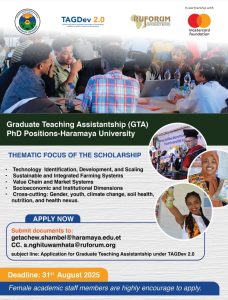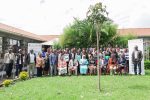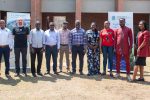Extended – Graduate Teaching Assistantship (GTA) PhD Positions – Haramaya University

Call for Applications: PhD Graduate Teaching Assistantship (GTA)
BACKGROUND
The Regional Universities Forum for Capacity Building in Agriculture (RUFORUM) in partnership with Mastercard Foundation, Gulu University (Uganda), Egerton University (Kenya), Africa University (Zimbabwe), University of the Free State (South Africa), Malawi University of Science and Technology (Malawi), University of Eldoret (Kenya), Uganda Martyrs University (Uganda), University of Port Harcourt (Nigeria), University of Cape Coast (Ghana), University of Bamenda (Cameroon), National University of Agriculture (Benin), and Université Mohammed VI Polytechnique (Morocco) are implementing a 10-year programme (2023-2033) called Transforming African Agricultural Universities to Meaningfully Contribute to Africa’s Growth and Development (TAGDev 2.0). The programme seeks to strengthen universities and TVET institutions to better serve communities by skilling and empowering Africa’s young people and their institutions to drive inclusive, equitable and climate resilient transformation of agriculture and agrifood systems. The TAGDev 2.0 programme is supporting young African students that are economically disadvantaged but academically competent to access university education. The scholarship is open to both female and male applicants. Haramaya University is engaged under the TAGDev 2.0 program through the establishment and implementation of the Agri-food System and Entrepreneurship Center (ASEC). Haramaya University is implementing the Agri-food Systems and Entrepreneurship Development in horticulture Value Chains (fruit and vegetable) in Ethiopia.
GRADUATE TEACHING ASSISTANTSHIP (GTA)
The Graduate Teaching Assistantship (GTA) Programme contributes to one of RUFORUM’s three strategic goals to “build synergy from networks of specialisation to develop quality human resources and capacity required to intensify and increase Africa’s agricultural productivity and competitiveness” and its Vision 2030 Strategy that focuses on building postgraduate training and research capacity in its member universities. The GTA programme has been implemented since 2015 to: (i) improve the quality of higher education and increase the pool of PhD-level trained academic staff in African universities; (ii) provide opportunities for the doctoral research to contribute more directly to African development; (iii) strengthen inter- university collaboration in the field of higher education in Africa; and (iv) promote staff mobility among RUFORUM member universities, and across Africa.
Under the GTA arrangement:
- The sending universities nominate the staff to be trained and RUFORUM Secretariat helps to get them placed in receiving (host) Universities.
- The sending universities commit to pay for travel, health insurance, upkeep and research of their staff under training.
- The receiving/host universities waive the fees and associated costs, and provide accommodation for the admitted GTA Fellows.
- Once admission process is completed, the sending and host universities and the nominated GTA Fellow sign a Tripartite Agreement to guide the hosting and training of the Fellow.
- In some cases where opportunities exist, the host University may attach the GTA Fellow to the research program at the hosting university.
- The RUFORUM Secretariat facilitates the GTA arrangement and follows up on the GTA training.
SCHOLARSHIP BENEFITS
The program will offer GTAs modest upkeep, research funds, tuition waiver and accommodation. The candidates will have the opportunity for a team-based mentorship and supervision by a team of multi-disciplinary, interdisciplinary and highly experienced professionals/ drawn from Haramaya University and partner institutions.
GTAs will receive training in participatory research, stakeholder engagement, value chain analysis, PRA, community-based action research and other relevant skills, and will be actively involved in data collection and problem-solving activities for the TAGDev project. They will benefit from additional courses such as personal mastery and soft skills, academic writing and publishing, systematic reviews, and data analysis. GTAs will be supported to present their findings at local PhD conferences and participate in a one-time RUFORUM event upon graduation.
GTAs are expected sign an agreement with Haramaya University, the host institution, and their home institution to engage in teaching assistantship at the host university. Nearly 70% of the opportunities under the this call will be going to women academic staff members.
ELIGIBILITY CRITERIA
Haramaya University is providing 25 GTA positions for PhD students for academic year 2025/26. This GTA will be embedded into the implementation of the TAGDev 2.0 to increase the practical relevance of the candidates’ research endeavors and make their research activities become part and parcel of the project deliverables.
The GTA is open to all qualified PhD students who:
- are from RUFORUM member universities (Haramaya University, Wollo University, Mekelle University, Jimma University, Bahirdar University, Aksum University) willing to conduct research in the priority thematic research areas.
- are from RUFORUM Member universities outside Ethiopia specifically; Bugema University (Uganda), University of Liberia (Liberia), and University of Ndjamena (Chad) willing to conduct research in the priority thematic research areas.
- have a background in agriculture and related fields, including agriculture and rural innovation, rural development, horticultural sciences, agribusiness and value chain management, climate-smart agriculture, natural resource management, agriculture, nutrition and health nexus, agroecology and biodiversity conservation, soil sciences, food sciences and post-harvest technologies, as well as agriculture knowledge management or agricultural information sciences; have good academic standing.
- from member universities who are willing to relocate to Haramaya University and remain there for the entire duration of the study.
- Have started their PhDs, have finished their coursework, successfully defended their proposals that fall in the project’s thematic priority as specified in this call, and/or have prepared the necessary conditions to start data collection (applicable to colleagues at Haramaya University ONLY).
- have developed compelling concept notes about their research and expected outcomes.
- are willing to engage in community-based action research to develop innovative solutions and frameworks to address key challenges across the integrated potato and its allied value chains;
- with demonstrable interests or experiences in teaching, research, or relevant disciplines;
- can bring a letter of endorsement from their supervisor, the department/school, and academic vice-president/Deputy Vice Chancellor/ Vice Rector;
- can demonstrate the need for financial support (candidates who have already secured funding from other organizations are not eligible to apply), and
- have the ability to commit to assistantship duties that are part of their GTA activities in the host university (at Haramaya University).
Thematic focus of the scholarship
To directly contribute to the project’s outcomes, GTAs are expected to engage in community-based action research across the potato and related value chains in the project target areas. Potential thematic areas may include, but are not limited to:
- Technology Identification, Development, and Scaling
- Identifying and mapping locally existing Technologies, Innovations, and Management Practices (TIMPs);
- Testing and scaling up proven climate-smart technologies and innovations (CS TIMPs), and
- Integration of ICT in agriculture
- Sustainable and Integrated Farming Systems
- Integrated livestock-potato/vegetable farming (including livestock feed improvement, etc.);
- Integrated soil fertility management.
- Water resources management.
- Integrated pest management (IPM), and
- Nature-based solutions
- Value Chain and Market Systems
- Post-harvest Management Practices (PHM)
- DLS;
- Integrated community seed systems, and
- Agribusiness and value chain management across the potato and allied VCs
- Socioeconomic and Institutional Dimensions
- Impact assessment of targeted interventions (Such as scaling and adoption of TIMPs, vegetable marketing, etc) on food and nutrition security, income, adoption, and scaling etc.);
- Youth agripreneurship and Incubation program;
- Assessment of the effectiveness of multi-stakeholder innovation platforms, behavior change communications.
- Impact assessment of community-based action research and participatory methods on technology uptake, and
- Assessing the role of local institutions and indigenous knowledge on learning and technology adoption across the Value Chain.
- Cross-cutting
- Gender, youth, soil, climate change, nutrition, and health nexus
Applicants are required to meticulously prepare their concept notes that are well aligned with one of the above themes.
SELECTION CRITERIA
The GTAs selection process will involve the following key aspects.
- A project steering Committee (PSC) will be established to evaluate the application in consultation with the student recruitment and selection committee and make a final decision on the application. Student selection criteria will include:
- Age (below 40);
- Relevance of the academic background and level.
- Relevance of the concept notes to the project’s goal and priorities,
- Quality and completeness of the relevant application documents, such as the application form, CV, and degree certificates.
- Research and work experiences, publications, motivation letters, and recommendation letters;
- Evidence of financial need (economically disadvantaged, marginalized groups, coming from conflict and post-conflict areas, etc) – candidates who have already secured funding from other organizations are not eligible to apply!
- Willingness and commitment to complete the training within the 36 months period
- Decisions regarding the award of the scholarship will be made by the Project Steering Committee (PSC).
- The selected candidates will sign an agreement to follow the GTA program.
- The project will ensure affirmative action by giving priority to female candidates, candidates with disabilities and severe economic problems and those who come from conflict-affected areas, without of course, compromising the other relevant academic and professional criteria that need to be met to compete for the scholarship.
- Female academic staff members are highly encouraged to apply.
HOW TO APPLY
- Interested candidates should submit the documents listed below to the Haramaya University TAGDev 2.0 Project Coordinator, Dr. Getachew Shambel (getachew.shambel@haramaya.edu.et ) with a copy to Ms. Selma Nghituwamhata (s.nghituwamhata@ruforum.org) with the subject line: Application for Graduate Teaching Assistantship under TAGDev 2.0 by 31st August 2025
- A motivation letter outlining their research interests and suitability for the position
- A detailed Curriculum Vitae (CV)
- Certified copies of academic transcripts and degree certificates
- A research proposal (maximum 10 pages) outlining their proposed research project
- A letter of nomination from the President/Vice Chancellor/Rector of their home university.
- Endorsement letters from their supervisor, the department/school, and academic vice-president/Deputy Vice Chancellor/ Vice Rector.
- A list of relevant academic publications
- Two copies of relevant academic publications
- Two recommendation letters containing contact information of the referees
Note: Females, refugees, internally displaced persons, and persons with disabilities are highly encouraged to apply.
Contact Information
For further inquiries, please contact: Haramaya University TAGDev 2.0 Coordinator, Dr. Getachew Shambel (getachew.shambel@haramaya.edu.et) and Ms Selma Nghituwamhata (s.nghituwamhata@ruforum.org)







